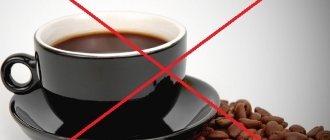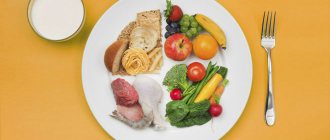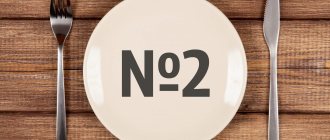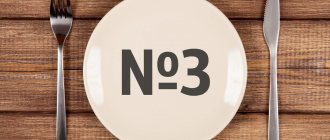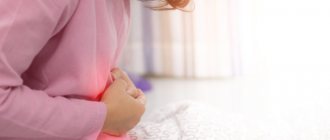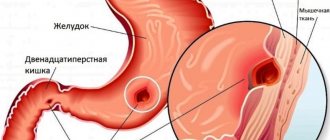Gastroduodenitis is a disease of the gastrointestinal tract, which is characterized by the occurrence of an inflammatory process in the mucous membrane of the stomach and duodenum. The disease occurs in acute or chronic form. Diet therapy for gastroduodenitis is the basis for the treatment of this disease. Following a diet allows you to relieve the inflammatory process on the mucous membrane and prevent complications from developing.
Nutrition for chronic gastroduodenitis
In case of chronic gastroduodenitis, it is necessary to avoid eating fatty, spicy and salty foods. Preference should be given to lean types of meat and fish: young beef, veal, rabbit, turkey and chicken. Salted fish, offal, goose, duck and lamb should be excluded. Nutrition should be as gentle as possible. It is preferable to boil or stew food rather than fry it.
If you have
a chronic
form
of gastroduodenitis
, then you should regularly
carry out preventive treatment
.
What can you eat?
Caloric and nutrient requirements must be met through milk. This product has all the necessary properties (the required content of protein, fat, vitamins, alkalization), some people have intolerance and bloating appears. Pureed liquid porridges are prepared using diluted milk.
Signs of intolerance can be eliminated by adding milk to tea, diluting it, and drinking only in small sips when warm.
The diet calculation includes at least 30% refined vegetable oils (olive or sunflower) in the fat composition. Fish and meat dishes are allowed only pureed, boiled or baked, steamed meatballs, meatballs, soufflés. Vegetables are used in decoction and vegetarian soups, always pureed. Thin pasta should be cooked through. Only dried wheat bread can be eaten.
Types of diets for gastroduodenitis:
For gastroduodenitis, diet No. 1, diet No. 5, diet No. 2 are prescribed.
Diet No. 1 is prescribed for high acidity. For gastroduodenitis with high acidity, preference should be given to pureed dishes, slimy soups, and boiled porridge with milk. Meals should be fractional, at regular intervals. It is important to chew all food thoroughly.
Table No. 2 is prescribed for gastroduodenitis with low acidity (atrophic gastroduodenitis). Meals should be fractional, at regular intervals. Solid and liquid foods are taken separately. Be sure to follow the drinking regime - at least 1800 ml. fluids per day
Diet No. 5 is necessary for all people suffering from chronic gastroduodenitis for daily nutrition without exacerbation. If you have been diagnosed with chronic gastroduodenitis, then diet No. 5 is the diet that you need to adhere to throughout your life. It will no longer be possible to return to unhealthy, fried, spicy foods, or fast food. Any violation of the diet will lead to an exacerbation of the disease.
Basic Rules
The goal of dietary nutrition for duodenitis is to achieve maximum chemical, mechanical and thermal gentle functioning of the digestive tract, and reduce the inflammatory process in the duodenum.
A diet for duodenitis involves limiting carbohydrates in the diet, but remains physiologically complete. According to the classification of treatment tables according to Pevzner, it corresponds to table No. 5. By order of the Ministry of Health of the Russian Federation No. 330, the prescription of a gentle diet (SB) is indicated.
Daily nutrient content:
- proteins – 85-90g, of which 60-70% are proteins of animal origin;
- fats – 70-80g, of which up to 20% are fats of vegetable origin;
- carbohydrates – 300-350g.
The energy value of the diet is 2170-2480 Kcal.
Basic principles of the treatment table for duodenitis:
- diet; Meals should be fractional, up to 5-6 times a day, at the same hours. Frequent meals in small portions can reduce inflammation by reducing the production of gastric juice and pancreatic juices that irritate the duodenum, as well as normalize the entire functioning of the gastrointestinal tract.
- temperature regime; Food should not be cold or hot (15-60°C), which ensures a gentle thermal effect.
- culinary processing; Dishes should be served pureed, boiled or steamed. Only liquid and mushy foods are allowed.
- salt; Salt in medical nutrition is somewhat limited (up to 8g per day): sodium chloride increases the secretion of gastric juice, which irritates the inflamed intestine.
- alcohol and smoking; During the period of exacerbation of chronic duodenitis or acute duodenitis, there is a categorical ban on alcoholic beverages. Ethanol stimulates gastric secretion and also slows down the regeneration of the duodenal mucosa. In addition, patients should stop smoking.
- chewing food; It is necessary to chew food thoroughly: this increases its mechanical processing and accelerates the onset of satiety. When eating, you should take moderation and not overeat, since the inflamed duodenum will not be able to ensure normal processes of breaking down food, which will aggravate the symptoms of duodenitis.
- product selection; It is necessary to exclude from the diet all foods that have a stimulating effect on gastric secretion and irritate the organs of the gastrointestinal tract.
- composition of dishes; In therapeutic nutrition for duodenitis, simple but varied dishes with a minimum number of ingredients should prevail. Complex dishes linger in the stomach for a long time, which means they increase the secretion of hydrochloric acid.
List of permitted products:
| vegetables | Boiled or stewed. In the form of puree or small pieces |
| Non-fat varieties of meat and fish in pureed form (minced meat) | Can be prepared in the form of cutlets, meatballs, steamed meatballs or stewed |
| Rusks, dried bread | In small quantities. Eating dry food is strictly contraindicated |
| Low-fat fermented milk products | Cottage cheese, cheese, yogurt, cottage cheese casserole, low-fat sour cream, low-sour kefir |
| Vegetable oil, butter | Can be consumed in small quantities. |
| Cereals | During periods of exacerbation, cereals should be boiled. |
Recipes
Here are recipes for preparing some dishes at home.
First meal
Carrot soup
Eggs, carrots, flour, low-fat meat broth, butter.
Boil the carrots in the prepared broth until tender, remove them and grate them on a fine grater. Fry the flour and mix thoroughly with the carrots. Combine the resulting mixture with the broth. Boil, add lightly beaten chicken eggs, add butter.
Vegetable soup with meat broth
Broccoli, carrots, tomatoes, zucchini, meat broth, low-fat sour cream, salt.
Boil vegetables in the prepared broth until tender, add salt and sour cream.
Second courses
Baked fish with mashed potatoes
Any white lean fish, potatoes, butter, salt.
Boil the potatoes, mash, add salt and oil. Bake the condemned pieces of fish in the oven.
Chicken breast with vegetables
Steam the allowed vegetables, cook the chicken breast in a slow cooker, pour in butter.
Desserts and drinks
Berry (fruit) cheesecake
Soft cottage cheese, oatmeal, sweet berries, butter, sweetener egg, gelatin.
Grind the oatmeal in a blender and mix first with the white, and then the yolk and sweetener. Add cottage cheese and mix. Place the resulting mixture in the prepared pan (grease the walls with butter), add the gelatin previously diluted in water, mix and place in the oven for 40 minutes.
Kefir + strawberry drink
Kefir 1%, granulated sugar, strawberries (strawberries).
Rinse the berries thoroughly with water and sort. Cover with sugar for one hour. Pour in kefir and beat with a blender until thick foam. Cool.
List of fully or partially restricted products:
| Sour first courses (borscht, cabbage soup) | Irritate the mucous membrane |
| Bean dishes | Cause flatulence |
| Alcoholic and carbonated drinks | Irritate the gastric mucosa |
| Smoked products | Increase secretion and lead to exacerbation of the disease |
| Canned foods | Irritate the mucous membrane of the digestive tract |
| Hot and spicy sauces | increase the secretion of bile and gastric juice |
| Fast food, food products with flavor enhancers and chemical additives. | These foods irritate the mucous membrane and are difficult to digest |
Advantages and disadvantages
| pros | Minuses |
|
|
Nutritionist comments:
Treatment with diet is a necessary condition that must be fulfilled on the path to recovery. Not a single drug, even the most effective one, according to advertising, can completely cure you without following a diet.
“The right choice of a sanatorium is a significant step towards maintaining and increasing health. “Gorny” is a resort complex that combines the experience and knowledge of Russian and Soviet balneology. The presence of modern medical equipment and innovative installations, the professionalism of the staff and love for their work will serve as the key to extending longevity,” - head doctor of the sanatorium Alexander Olegovich Karaulov.
Features of table options No. 1
Table No. 1a - recommended for exacerbation of gastroduodenitis in the first week of therapy. Usually the patient is in a hospital setting and the composition of the products is monitored by a nutritionist. This option provides maximum sparing conditions for the stomach and intestines. In just one day you can eat 2.5 kg of food, calorie content is limited to 2200 kcal. In the diet, proteins are reduced to 80 g, carbohydrates - to 200 g.
The patient is prepared with liquid porridge with water or diluted milk from oatmeal, rice (buckwheat and millet are not recommended), milk soup with small noodles, meat soufflé, jelly made from non-acidic berries. Allowed is one soft-boiled egg or steamed omelette, fresh grated cottage cheese. For drinking - a decoction of rose hips.
You can move to table No. 1b after an average of a week or ten days. The menu increases the amount of protein to 100 g, carbohydrates to almost normal (400 g), the total weight of food per day is increased to 2.5–3 kg, and calorie content to 3000 kcal. The food remains semi-liquid, but vegetable purees, stewed rolled vegetables with meat, steamed meatballs and cutlets, buckwheat, rice and oatmeal with the addition of a little sugar or honey are allowed.
Full Table #1 - Follows option 1b. If all restrictions are observed, the daily weight of food increases to 3–3.5 kg. Requirements regarding cooking methods remain. Milk noodles and vermicelli are allowed, egg omelet is allowed, and low-fat kefir is added (two glasses per day). Caloric content allows 3200 kcal, and the composition is almost brought to normal.
How long it is necessary to follow a strict diet is determined by the doctor based on the results of the recovery period.
5 g butter is added directly to the plate
General rules
Treatment for this type of disease is long and takes place in several stages. In addition to drug therapy, it is very important to adhere to the recommended diet. The daily routine and the absence of emotional overload are of no small importance. Under no circumstances should you self-medicate.
One of the basic rules of nutrition during gastroduodenitis is that it is unacceptable to eat foods that are too hot or cold, everything should be at room temperature. Failure to comply with this rule can significantly reduce the effectiveness of even properly selected drugs.
You need to eat 6 times throughout the day and always in small portions, chewing your food well. This approach will completely eliminate the feeling of hunger and normalize the digestive process and stabilize metabolic processes. There is a complete ban on any spicy foods. The first course must be included in the daily menu. You can’t overeat, no carbonated drinks or alcohol. The same rule applies to fried foods. You should not eat vegetables with a rough structure and fibrous fruits. You will have to completely give up snacking on the go.
